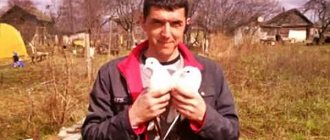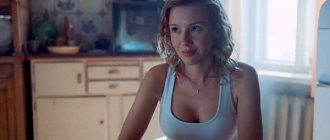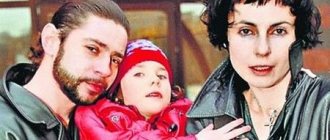Biography
Stanislav Lyubshin was born in the Moscow region. All of his childhood and school years were spent in the village of Vladykino. His father worked as an agronomist, and his mother was a cowgirl.
Stanislav Andreevich recalls: “I lived in a village near Moscow, Vladykino, which is now Moscow. There was a state farm in our village. My mother worked in the barnyard, my father was an agronomist, then a military man. The environment was rural, the area was difficult. Such as now, offending people, robbing the elderly, robbing the poor, stealing bags - this did not happen. If they robbed, then a savings bank or a store. Our store was robbed every month. There was one store, and on the 30th or 31st it was robbed. Everyone knew in advance what time it would be.
Or vice versa. Outside the gates of our state farm there was a beer hall, it was called “Yagodka”. The adult guys will hook her onto the bus and take her three stops. People come in the morning, but she’s not there, you have to walk three stops to get a hangover. These were the numbers. There were three of us parents, I was the eldest, my brother was a year younger, then my sister. And I, in general, took a responsible approach to life.”
Already in childhood, the boy showed artistic abilities. Together with my mother, I played in a drama club at a local state farm: “I started working at the age of eight. At first, on a state farm, he chased jackdaws in the garden, scared away crows, then he worked his way up to being a watchman, and made an agricultural career. And my mother was engaged in amateur activities. These women, who got up at four in the morning and went to milk the cows, then came and took care of the children and the house all day, they wanted something more. They organized a drama club at the state farm, they staged “The Thunderstorm”, “Warm Heart”, yes, serious literature.”
After graduating from school, the young man decided to become a welder. He entered the Oxygen Welding College, worked at night as a watchman, then went to serve in the army. Stanislav did not work in his specialty, although the director of the technical school invited him to stay.
All these years Lyubshin dreamed of a theater institute. And, promising his parents that he would become the leading actor in the country, he submitted documents to the Shchepkinsky Theater School.
“I decided to consult with my parents. The neighbor, again, as in “Five Evenings,” had a KVN TV with a lens. When people walked on the floor, the water in the lens swayed, and the artists were striped. Here the father and mother are sitting and watching. And there Ivan Semenovich Kozlovsky sings, and the choir stands behind him. I say: “Mom-dad, I would like to test myself, go take an exam at the theater.” For some reason my mother cried, that was her reaction. And the father was silent, silent and said: “If you are like him,” he pointed to Kozlovsky, “go.” And if it’s like him, then there’s no need,” says Stanislav.
In 1959, Lyubshin received an artist's diploma.
Childhood and youth
Stanislav Lyubshin was born on April 6, 1933 in the Moscow region. There, in the village of Vladykino, he spent his childhood. His father worked as an agronomist, his mother as a cowgirl. The family lived modestly. Stanislav is the eldest of three children in the family. To help his parents, at the age of 8 he experienced hard peasant work: first he drove jackdaws away from the trees in the state farm garden, then he worked as a watchman.
Actor Stanislav Lyubshin (still from the film “If You're Right”)
Village women got up at 4 am and went to rest closer to midnight. There was no entertainment, so they independently organized an amateur theater group. Serious performances were staged on an improvised stage, and Lyubshina’s mother always played the main roles in them. Since then, the boy became interested in theater.
During his school years, he himself began to attend a drama club, but after graduating from school he entered a technical school, then served in the army. Stanislav did not work in his specialty, although the director of the technical school invited him to stay.
Stanislav Lyubshin in his youth (still from the film “There will be no layoffs today”)
Before entering the theater institute, the guy consulted with his parents. Stanislav Lyubshin recalls that the mother then began to cry, and the father was silent for a long time, then agreed, but on the condition that his son would become a leading actor. The guy entered the Shchepkinsky Theater School, and in 1959 he became a certified actor.
Theater
Upon graduation, the aspiring actor was accepted into the Sovremennik Theater. He performed many roles: Slavka in the play “Five Evenings”, Henry and Christian in the production of “The Naked King”, Shamanov in “Last Summer in Chulimsk”, Capercaillie in “Two Flowers”.
Since 1964 he worked at the Taganka Theater. The audience remembers him from the productions “Hero of Our Time” and “The Good Man from Szechwan”.
Stanislav Lyubshin also worked at the Ermolova Theater and the Theater on Malaya Bronnaya. And in 1981 he moved to the Moscow Art Theater. Chekhov, where to this day he delights fans with his talent.
On the Moscow Art Theater stage he played in the plays “Three Sisters”, “The Cherry Orchard”, “Ivanov”, “Boris Godunov”, “A Little Tenderness”, “Mephisto”, “Glory”, “Night of Lovers” and many others.
Theater works
"Contemporary":
- “Five Evenings”, Slavka
- "The Naked King", Henry, Christian
- "Two Colors", Capercaillie
- “Continuation of the Legend”, Gregory
- "The Third Wish", Old Man
- "By Moscow time"
- "Fifth column"
Taganka Theater:
- “The Good Man from Szechwan”, Joiner
- "Hero of Our Time", Author
Theater named after M. N. Ermolova:
- “Last summer in Chulimsk”, Shamanov
- “House with windows on a field”, Teacher
Theater on Malaya Bronnaya:
- “Veranda in the Forest”, Pakhomov
- "The End of Don Juan", Sganarelle and Leporello
Moscow Art Theater:
- "Tartuffe", Tartuffe
- "Collapse", Prince Khevistavi
- "Ghosts Among Us" by Keisuke Fukugawa
- "Rut", Piromov
- "Equus", Martin Deisert
- "Ivanov", Ivanov
- "The Cherry Orchard", Gaev
- "Possible Meeting", Schmidt
- "Boris Godunov", Holy Fool
- "Misha's Anniversary", Misha
- "Cyrano de Bergerac", Comte de Guiche
- "The One Who Gets Slapped", Count Mancini
- "Yu", Barsukov
- “A Little Tenderness”, Nenil
- "The Artist Descending the Stairs" by Bitcham
- “Cliff”, Titus Nikonych Vatutin
- “Alone with everyone”, Andrey Golubev
- “Crazy”, Andrey Golubev
- "Game of Towns", Actor
- "Mephisto", Professor
- "Night of Lovers", Actor
- "Fame", Actor
Cinema
Stanislav Lyubshin made his film debut in Zakhar Agranenko’s military drama “Leningrad Symphony,” where he played the role of a student. Then he starred in the short film “There Will Be No Layoffs Today” and in the comedy “The End of Color.”
"I am twenty years old"
Fame came to Lyubshin after Marlen Khutsiev’s youth film “Ilyich’s Outpost,” which was released in 1963. A film story dedicated to the youth of the sixties. His character - builder Slavka Kostikov - turned out to be sincere and real.
However, the film was criticized by Nikita Khrushchev, after which it was returned for revision. Two years later, it came out with a different title – “I’m Twenty Years Old” and won a prize at the Venice Festival.
Episodes of the film starred Andrei Tarkovsky, Alexander Mitta, Andrei Konchalovsky, Pavel Finn, Natalia Ryazantseva.
It also uses documentary footage of a poetry evening at the Polytechnic Museum with the participation of poets Evgeny Yevtushenko, Andrei Voznesensky, Robert Rozhdestvensky, Bella Akhmadulina.
"Shield and Sword"
In 1967, Stanislav was invited to play the role of intelligence officer Alexander Belov in Vladimir Basov’s series “Shield and Sword.”
The main character is the Soviet intelligence officer Alexander Belov, who left for Germany in the forties under the name of the German repatriate Johann Weiss. By 1944, Stirlitz’s colleague had achieved a strong position in the Abwehr, rose to the rank of chief lieutenant and was transferred to Berlin, to the SS service.
Now, in the Imperial Security Directorate, he can obtain vital information about major military operations, both first-hand and by obtaining it himself, at the risk of his life.
After the release of this film, millions of Soviet viewers declared their love for Stanislav Lyubshin, and he became a sought-after actor among directors.
Then the artist starred in the films “Red Square”, “Monologue”, “My Life”, “Stoves-Benches”, “Ksenia, Fyodor’s Beloved Wife”, “Sentimental Romance”, “A Word for Defense”, “Steppe” and others.
In 1977, Lyubshin appeared in the film based on Vasily Shukshin’s story “Call me into the bright distance.” He reincarnated as a loser man who becomes an alcoholic and loses himself.
"Five Evenings"
One of Stanislav Lyubshin’s best roles was the image of Alexander Petrovich Ilyin in Nikita Mikhalkov’s melodrama “Five Evenings.” The artist’s partner was Lyudmila Gurchenko.
The film takes place in the mid-1950s. Alexander and Tamara met and immediately fell in love with each other. Suddenly trouble came: the Great Patriotic War began. And they lost each other for 20 long years.
The film also stars Valentina Telichkina, Larisa Kuznetsova, Igor Nefedov, Alexander Adabashyan, Nina Ter-Osipyan and others.
Stanislav Andreevich recalls: “During these fifteen or seventeen days of filming, the atmosphere was amazing. I have never seen greater respect for an actor in my life. When the footage was printed the next day, he came running, hugged, and cried: “Glory, how great you played! What's your first take? And the second one, at my suggestion, is even better!”
After the release of Five Evenings, Lyubshin was recognized as the best actor of the year for the second time.
In 1980, Stanislav Andreevich played a forester in the drama “Don’t Shoot White Swans”, Alexander Fedorovich Laptev in the film adaptation of Anton Chekhov’s play “Three Years”.
Among his notable works of that period are "The Fun of the Young" and "The Black Monk".
In the early 90s, the artist starred in several television projects - “Skin”, “Woman at Sea”, “See Paris and Die”, “Dreams of an Idiot”, after which he concentrated on working in the theater. Russian cinematography was in complete ruin.
Stanislav returned to the screens again at the beginning of the new century. In Valery Rubinchik’s tragicomedy “Cinema about Cinema,” Lyubshin, together with Tatyana Lavrova, played actors who turned out to be unnecessary in modern cinema.
His roles in numerous TV series became successful: “A Horseman Named Death”, “Estate”, “Ermolovs”, “Lace”, “Raskol”, “Devil”, “Great”, “Godunov” and many others.
The most interesting
Top 10 curiosities at the Oksar awards ceremony (12/22/2017)
Famous actresses who should not show their legs (02/13/2020)
The first of these roles was Slavka Kostikov from Ilyich's Outpost, who, performed by Lyubshin, turned out to be sincere and real. According to the director, the young actor’s performance was distinguished by intelligence, and working with him was interesting and pleasant.
In the photo: Stanislav Lyubshin in the film “The Third Rocket”
There was a period in Stanislav Lyubshin’s creative biography when, in order to star in Tarkovsky’s Andrei Rublev, he not only left the Taganka Theater, but also refused to star in another film, the contract with which had already been signed, however, in the end , Tarkovsky gave the role to another actor.
“There was a terrible period in my life when Tarkovsky was fooling me with the film “Andrei Rublev.” I fooled my head for two years that I would play Rublev. Some people made preparations with it, made samples. And then his case began to drag on,” says Stanislav Andreevich.
Of course, Lyubshin was upset to be refused such a role, but even without it, the actor created many bright, memorable images in films.
"Shield and Sword"
In the 60-70s, Lyubshin was a very popular film actor - he starred in films such as “If You're Right”, “The Third Rocket”, “First Love” by Turgenev and many others.
"Ksenia, Fyodor's beloved wife"
His character from the multi-part film “Shield and Sword”, in which viewers saw Lyubshin in the image of the Soviet intelligence officer Alexander Belov, became a favorite for many.
In 1977, the film “Call Me to the Bright Distance” was released, thanks to which viewers became acquainted with the directorial talent of Stanislav Andreevich, who received an international film festival award for this film.
"Kin-Dza-Dza"
One cannot help but recall the comedy film “Kin-Dza-Dza”, in which Lyubshin starred in the title role. In the nineties, the demand for Stanislav Lyubshin in cinema dropped somewhat, but, nevertheless, he was never left without work.
In the photo: Stanislav Lyubshin in the film “Quadrille”
In those years, such wonderful films with his participation as “Tsar Ivan the Terrible”, “Eternal Husband”, the comedy “Quadrille” and others were released.
He continues to delight fans with his work in films. Among his latest roles are Archimandrite Joasaph in “Godunov”, the Wizard in “The Eternal Life of Alexander Khristoforov”, and the prince in “He is a Dragon”.
Lyubshin in the film “The Black Monk”
Director
Lyubshin's directorial path turned out to be thorny and long. In 1964, on the set of the children's film story “What is it like, the sea?” he met Vasily Shukshin.
Stanislav Andreevich recalls: “When we became friends, Vasily Makarovich gave me the script. I was an ordinary actor and had nothing to do with directing. But when I read the script, I was amazed by the characters, and I wanted to show them the way I perceive them. And I went to work at Goskino to make a film. However, they refused: according to the authorities, there was too much of Shukshin, who was inconvenient for them, on the screen. Then Vasily Makarovich and I decided to make a radio play. Shukshin himself was supposed to play Grusha’s brother.”
In 1974, Vasily Shukshin passed away; friends advised Lyubshin to resume attempts to obtain permission to film, but he was unable to do so.
He explains: “I didn’t feel comfortable walking after he died. They didn’t give it while I was alive, but here I’m going to speculate on death, as it were.” Fortunately, the management of Mosfilm heard that radio play and invited Stanislav Andreevich...
In 1977, the film “Call Me to the Bright Distance” was finally released. The main role in this ironic film story telling about the difficult fate of a lonely woman, Grusha Veselova, was played by Vasily Makarovich's widow Lidiya Fedoseeva-Shukshina.
Stanislav himself acted in this project not only as a director, but also starred in one of the leading roles.
The film was highly appreciated both in the Soviet Union and abroad. And in 1977, at the International Film Festival in Mannheim, he received the FIPRESCI Award.
In the early 80s, he released his second film - the drama “Three Years” based on the play of the same name by Anton Chekhov.
“And I would have made a third film, but cameraman Pavel Lebeshev, actors Evgeny Evstigneev and Oleg Yankovsky passed away. I wanted to work with them. An emigrant of Russian origin from Australia gave us money. But everything took a long time. Now I will humiliate myself and ask for money for a new film. It will be a film based on Chekhov. But I won’t be more specific. I am superstitious. This is a story, not a play, a chamber piece. I would like to play it myself,” explains the creator of the paintings.
Personal life of Stanislav Lyubshin
Stanislav Lyubshin was married twice.
When he was studying at a technical school, he met a student, Svetlana. She was among the trainees who came from the Timiryazev Academy and stayed in their village. After the wedding they lived for 44 years. They had two sons (Yuri and Vadim). The second of them, like his father, is an actor. Stanislav Lyubshin met his second wife in Poland. His wife, journalist Irina Korneeva, is much younger than her husband, by as much as forty years. Their romance began quickly and developed rapidly, painfully for the first wife. Many people do not believe in the sincerity of the feelings of a couple of different ages in love. But Irina has already managed to prove her readiness to be with her husband in sorrow and in joy, in sickness and in health.
In the photo, Stanislav Lyubshin with his second wife Irina Korneeva When Lyubshin had a stroke, it was his second wife who looked after him and helped in his rehabilitation. Stanislav Andreevich is already eighty years old, and Irina is still by his side. Now many are convinced that the actor’s second wife is not a swindler, but a loving woman. The biography is not full of adventures and life’s ups and downs, it is standard for all creative types: self-discovery, well-deserved awards, of which Lyubshin has many, the Muse is always nearby.
Author: Natsh
Personal life
The actor was married twice. He lived side by side with his first wife Svetlana for more than four decades. They met when he was a technical school student, and Svetlana was a student at the Timiryazev Agricultural Academy.
They have two sons. They connected their lives with cinema: Yuri became a cameraman, Vadim an actor. Lyubshina's daughter-in-law is the famous actress Elena Aminova. Granddaughter Daria continued the acting dynasty.
The second chosen one of Stanislav Lyubshin is journalist Irina Korneeva. She is almost 40 years younger than the artist. They met in Poland at a film festival.
Irina is the actor’s main assistant: she manages Lyubshin’s work affairs, monitors her husband’s health and, as he himself admits, is his “guardian angel.”
First marriage
The actor met his future wife when she was still studying at the Timiryazev Agricultural Academy. They, along with other students, were sent to the village for practice.
The couple began dating, and soon started their own family. It was Stanislav who insisted on signing. He was raised that way: once you fall in love, you need to get married.
Immediately after marriage, he moved to live with his wife and in 55 they had their first child. They decided to name the boy Yuri. At this time, dramatic changes take place in his life - he goes to study at the Shchepkinsky School. The guy understood that being a welder is good, but you can’t run away from your own calling - he knew his destiny was to become an actor.
Every classmate knew about Stanislav’s marital status. His wife often came to see him at school, attended performances and supported her husband during exams. She even brought her mother to see the performance.
The latter fact just led to Stanislav’s teasing. Classmates often joked with him, asking how his mother-in-law was feeling. He didn’t take such jokes and was always offended. He initially maintained a good relationship with his mother-in-law. As for the wife, she first tried to take control of her husband, experiencing bouts of jealousy.
Over time, when she got used to her husband’s craft, she did not take seriously rumors about her husband’s alleged affairs with one or another cinematic beauty. Svetlana said that as an ordinary editor, she and her colleagues worked on the Great Soviet Encyclopedia. At this time, her husband took advantage of the chance given to him and fully realized himself in his creative profession.
Of course, after her husband gained acting popularity, she began to tense up. When viewers saw the film “Shield and Sword,” she could not calmly be on the street with Stanislav. Fans immediately pestered him. Svetlana and the children had no place next to him. They already had two children together - in 1964 another baby was born. The boy was named Vadim.
Interview
Friendship with Shukshin
“We starred with him in a film called “What a Sea It Is.” Based on the story “Boy by the Sea” by Ukrainian writer Dubov. We filmed in Sudak. Vasily Makarovich had such a very difficult period in his life, and he, as a Russian person, showed himself very clearly in these moments. He could have taken the fence apart and smashed all the shafts. It was he who expressed himself so vividly in the evening, but in the morning he doesn’t remember anything. And in the morning - he also had an interesting character - when he came to do his make-up, he peered into every person. I tried, like a psychologist, to understand whether I offended him yesterday? He says: “Did I offend you?” - "No". Yeah, he sees that the person is friendly. He moves on to another - and this one, and that one?
The moment came when I began to tell him: “Shame on you, Vasya, you are such a writer, such a person, and you behave like that!” He sent me: “Fuck you... I was offended. Suddenly at two o'clock in the morning there is a knock on the window. I use “you”: “What do you need?” - “Okay, read it.” And he gives me seven handwritten stories. He wrote without any editing, just as he felt like it. I read these seven stories, and I felt so ashamed that I taught him to live. And that same night I thought: if I ever make a film, it will be based on its dramaturgy.
Well, then, it so happened that we communicated, there were some plans, there was life. And so he gave me the script “Call me into the bright distance.” I went to Goskino to bother. They tell me: “No.” I say: “What is the motive?” – “Shukshin will be on the screen a lot. He himself begins to film Kalina Krasnaya, and someone else.”
He and I agreed that I would do a play on the radio. And that's what real genius is. We played a play based on Vampilov’s “Last Summer in Chulimsk” at the Ermolova Theater. He put Tovstonogov in the BDT, and Andreev is here. Shukshin’s wife and Tolya Zabolotsky, his cameraman, watched both Tovstonogov’s and ours, and gave preference to our performance. Shukshin was in the hospital, and they told him a lot. So, when he left the hospital, he said: “Slava, I want to look.” Me: “Vasya, you should rest, you don’t need it later.” I tried to dissuade him. Everyone says - such a performance, the best performance of the year, but I think: it will come, and we will play poorly, it will be a shame, a shame. Nevertheless, he insisted, came, looked and said: “Let's put my script aside. This is what needs to be removed. Give me a play, I’ll go, write the script “Last Summer in Chulimsk”, I’ll work hard to get permission. If you want, I’ll be the artistic director and help.” He took the play, went to filming, and three days later he was gone.
So, for a person to say that it’s not him that is needed, but someone else, that he’s more interesting, this almost never happens. For Shukshin, Vampilov became a discovery and a shock. He began going to theaters and began writing plays. Then I started doing the play “Call Me to the Bright Distance” on the radio. And for the role that Vasily Makarovich wanted to play, he asked Ulyanov. Then on the radio I wanted to test myself, whether I could formulate the director’s vision, whether I could work with actors, whether I had enough strength, because this is a completely different profession. And when I made a radio play - and Shukshin was no longer there - many people told me: go, worry about the film. Now, after the radio play, they will give it. But I was somehow ashamed to walk around after his death. They didn’t give it while I was alive, but here I’m going to speculate on death, as it were. I didn't go anywhere. When the management of Mosfilm accidentally heard a radio play, she invited me. And the funniest thing is that I was amazed that the radio play was bought by seven countries. Well, let’s say Cuba, Czechoslovakia, that’s understandable. But England bought it. I don’t know how they translated Vasily Makarych’s language.
After that, when they called me, I agreed, and we started filming the film. He also received our Grand Prix, a critics' award in Germany, in Mannheim. They took all our money - that was the order then - and gave four of us 70 rubles from the bonus. Like a scholarship to an oxygen welding college. Ulyanov became angry and wanted to go to the Central Committee to make a scandal. Then I remembered that he himself was a member of the Central Committee and did not go. But the funniest thing was later, when there was a week of Soviet films in Bonn, which opened with our film.
After the premiere, the man who founded this prize gave us a banquet at his apartment. I won’t tell you what apartment it is. He was the editor and owner of Stern magazine. A lot of people gathered, respectable people; someone else fought against us in the Hitler Youth detachments. Well, such a conversation: “Stanislav, how did you manage the bonus?” And the delegation included me and the Minister of Cinema, Pavlenok. I say, pointing to Pavlenko: “But he took it away.” There were two translators, a German and from our side. The German asks me: “Stanislav, should I translate literally?” Me: “Yes, yes.” He says: “They took it away from him.” The minister says: “Why did you say that?” I say: “Why did you take it?” The translator translates everything. They die of laughter: “How can you take it away?” Pavlenok: “The camera is not his, the film is not his, the state gave him an education.” - “But he’s a director?” - "He". - “What about the director’s award?” - "Yes". - “So why did they take it away?”
Then I was not allowed to go anywhere for many years. But when they called me back to this Mannheim, and I was a member of the jury there, I carefully made sure that the envelopes were handed directly into the hands of the directors. We were not invited then, some person from Goskino took the prize, we learned from the Voice of America that we had been awarded. That was the story.
And when I watched in Bonn how Shukshin was received - he has a special humor, an unusual language, I think how it will be - the same reactions, the audience laughed and cried. It turns out that when things are human, everyone understands them. And it doesn’t matter what language they speak or play. When it’s sincere, people understand everything.”
About the roles
“Our profession is such that people choose us. Like the girls from the former Gorky Street. I once said this when we were talking about... So Adabashyan replied: “You see how lucky artists are. It’s like they’re being chosen from Gorky Street, and we’re being chosen from someone like Mnevniki.” So we are all addicted. So what if I would like to play this or that. I know that I would like to play Uncle Vanya. For many years, critics and journalists have advised and told many directors. No, on the contrary, they say what they are telling us. They are leaders, and they always don’t like it when there is some kind of opposition or tipsters. There are three roles that I regret. I would like to play Khlestakov.
And now I would like to play Prince Myshkin. And here is Uncle Vanya. This is probably impossible due to age or situation. I would like a lot, but nothing depends on you. They give it to you, but you can only refuse. As they say in one movie: “I’ll make you an offer you can’t refuse.” “Yes, they make us offers that we cannot refuse. But they don’t make us any offers that we could agree to.”
Failed works
“I will say that of the roles that I played, objectively I failed only one role. It was when I was studying at the oxygen-welding technical school and doing amateur performances that I was asked to play Santa Claus at a matinee. So it’s a matinee, they brought the kids. And I somehow internally felt that Santa Claus was not my role, because I was also very thin, and when I put on a beard and went out, the children just cried a lot. That’s when I realized that I had failed the role, and I kept waiting for this performance to end.”
Bad streak
“There was a terrible period in my life when Tarkovsky was fooling me with the film “Andrei Rublev.” I fooled my head for two years that I would play Rublev. Before this, seeing “Ilyich’s Outpost”, he wrote me a note that I will not make public, I will keep it in the archives. And here it is: “Slava, you will play Rublev.” Some people made preparations with it, made samples. And then things started to drag on for him. Time goes on and on, and they invite me to other films, I go to some negotiations. I ask him: “Well, Andrey?” He says: “Slava, try out. If you need anything, I'll tell you right away. But it will be necessary."
And so they invite me to another film, without even an audition, I agree, but I say: “If Tarkovsky tells me to act, will you understand me?” - "Yes, sure". I'm coming to Leningrad. Since they hire me without an audition, I also recommend artists. Gubenko arrives, others. And suddenly the director of the film hands me a contract with blank numbers, a blank sheet of paper. And he explains: “You are arriving now, you have to pay for the hotel, but I will pay for you, sign for it.” And I, without flinching, sign on a blank sheet of paper, but I feel some kind of catch. Some time passes, I come again, again I pay for the hotel myself - “we’ll check you out later.” And then a pause. I call Tarkovsky, he says: “Slava, you need to be free.” I’m taking a year off from the Taganka Theater where I worked. Yuri Petrovich Lyubimov lets me go, but on conditions: if you leave for a year, then I will take another artist in your place. I say: “Well, of course.” I send a telegram to the director in Leningrad: “Do you remember how you and I agreed - I won’t be able to take part with you.”
A month passes. Terrible calls begin from Leningrad: “You are disrupting the preparatory period.” I say: “I gave the director a telegram, we agreed.” They are looking for a replacement, even Volodya Vysotsky tried out, and someone else. The director refuses everyone, saying: “This one has to play.” And it leads to the fact that they want to force me. And at this time, while I am fighting for human rights, Andrei Tarkovsky, unexpectedly for me, takes on another artist. And suddenly I find myself in a situation where he doesn’t take me for the role of Rublev, I left the theater, and these people want to force me to act in them.
The director arrives and I am summoned to Goskino. I say: “No, their script for the second series has not been completed, the countries are not the same, and in general, how can they force me if I warned that I would not.” “No, no, no, you have to.” They call me and summon me to the Central Committee. I say: “I’m not a party member, I won’t come to you.” That is, they are already trying to force everyone. Kulidzhanov, who headed the main command, calls me and says: “I must ban you from acting in films for a whole year.” I say: “What is the motive?” - “You put the personal above the public.” Here's the wording.
And I find myself in a situation where my second son was born, who needs to be fed, my wife doesn’t work, I can’t return to the theater, because then they’ll throw out the person Lyubimov took. And Lyubimov advised me: “Slava, just say that you’re sick, and then everyone will leave you alone.” I say: “But I’m not sick.” And that means they issue an order: “Ban for a year...” And send it to all film studios in the country.
But what does Kulidzhanov do? The film “Boy by the Sea” begins at the Gorky Studio, where I starred with Shukshin. Realizing that all this is terrible, when the director comes to complain, Kulidzhanov says: “You have been approved for the role, you go, I will delay the order, then you will be filming there, and no one will be able to cast you in the next film.” And I went there.
So, after two months, more applications for me came from all the studios in the country than in my entire life. And six months later the order was canceled. But the situation was terrible when I knew what to do and how to get out of it. Lived on credit. Then these debts had to be repaid. In general, there were a lot of interesting things in life, figuratively speaking.”
About loneliness
“As Anton Pavlovich said, the main thing in life is loneliness. Why, say, do actors gravitate so much towards Chekhov? Because he is lonely like no one else. Maybe it’s in the nature of an actor, even if he succeeds, plays typical roles, negative and positive heroes - nevertheless, a person is lonely by nature. Actor too. So he played some role. Then he goes home. He was some other person. If he managed to be that person that evening, then on the way home he breaks up with him. He must somehow come to his senses. This moment is very painful for you. Nobody needs you, you are alone. And if you're on tour, you don't have a loved one with you. You come, it seems like there was some kind of success now, everyone was happy, and you were happy that you did well. Then you are left alone - no one needs you, no one knows what you are thinking about, what is wrong with you.
Only returning to Chekhov’s work do you realize that even Anton Pavlovich was a lonely man. That he outlined this in his plays, stories, stories, characters. Then you understand that maybe it is even necessary for a person to feel loneliness and be alone. Maybe this is some kind of special state for a creative person.
I can imagine how Chekhov came from Melikhov on the crossroads. In the evening I was waiting for my wife Knipper-Chekhova. He rented a room in some hotel, "Ural", or what? According to his watch, she should have arrived by now, but she doesn’t come. She arrives two hours late. She smells like red wine. And then in the morning he again, coughing, drove to Melikhovo. And this is not an electric train, not a Mercedes that is taking him to Melikhovo. It’s snowing, slippery, a little horse, a man sitting with a whip, also alone. Here they are, traveling together, useless to anyone, abandoned on this earth. They arrive there. They were happy there and were waiting for Anton to arrive. Had arrived. What did he bring in his heart, in his memory after this evening, after this night?
There is a good shot in the film “My Life” when he leaves this estate of his, and it is snowing heavily. We managed to film it the way we wanted. He is being dragged somewhere on this cart. Life is hard, it seems dull and hopeless to many...
About working with the niece of Marshal Zhukov
“Margarita Pilikhina was the operator of Zastava Ilyich. We were friends with her, I visited her. Her husband was an aircraft designer. On their wall hung a huge portrait of Zhukov.
Margarita had a masculine character. She was brave, she filmed oncoming trains. What is the distance between them? I once found myself between trains and was knocked off my feet by the wind. And she lay down on a ZIS truck with a camera and worked. They tied it down so it wouldn't fly off.
At one of the screenings of Ilyich's Outpost, Rita appeared with someone already in the dark. Then only I saw that it was Marshal Zhukov - in orders and a gabardine suit. He began to defend the film. I asked why he came. And Marlene said that Rita is his niece.
Zhukov was a serious figure, but he didn’t find any mistakes in our film, he swore at everyone who found them. How much we all went through then. And one critic came to me recently and said that she watched Ilyich’s Outpost and saw nothing in it. My heart sank at her words. How to talk to her after this? She doesn’t understand anything, and at the same time she’s a critic. How I just played a performance that evening.”
Prizes and awards
- Order of Friendship (2014)
- Order of Merit for the Fatherland, IV degree (2003)
- Order of Honor, in connection with the 100th anniversary of the Moscow Art Theater (1998)
- People's Artist of the RSFSR (1981)
- Award for Best Performance by a Male Lead for Five Evenings at the Young Cinema Film Festival in Hyères (France) (1979)
- According to a poll by the magazine "Soviet Screen" he was recognized as the best actor of 1968 (for his role in the film "Shield and Sword") and 1979 ("Five Evenings")
- Honored Artist of the RSFSR (1969)
- Winner of the Moscow Komsomol Prize
Based on materials from Wikipedia and websites: mxat.ru, kino-teatr.ru, vokrug.tv, sinergia-lib, vkrugu7i.ru, newshevelev.narod.ru.
Young wife - Lyubshin's shield and sword
Once I ran into Lyubshin on a boat
- Oh, is that you?! - I burst out. The artist was wearing a simple shirt, jeans and light slippers. But even in slippers, Lyubshin seemed like a socialite to me. Noble gray hair, long hair and... detachment in his gaze. There was something princely about it.
This was in the mid-90s. The Moscow Art Theater troupe, led by Oleg Efremov, cruised along the Volga on a motor ship. The actors were greeted warmly. They set tables in restaurants...
Oh, there was such courage on stage during the play “Misha’s Anniversary” with Lyubshin in the title role! His hero gathers a company in which Misha’s two ex-wives, his current fiancee and many other people find themselves together...
Tomorrow, on Stanislav Lyubshin’s 70th birthday, this performance will be shown again at the Moscow Art Theater. As they dubbed it in the acting circle - “Slavin Mishin’s anniversary.” Then the actor will be congratulated by famous women - Alla Demidova, Olga Ostroumova, Lyudmila Gurchenko...
But most of all in the narrow theater crowd they wonder whether the young wife of the hero of the day, who is thirty years old, will appear on stage? Lyubshin tries not to advertise his new wife, keeps everything secret. But we not only found out that the actor’s Muse is Irina Korneeva, a columnist for the newspaper “Vremya MN,” but we also interviewed her.
— They say that you met Stanislav Andreevich ten years ago, as a student, when you came to his studio?
— We really met 10 years ago. But not in the studio (Slava does not have a studio, and if you mean the Moscow Art Theater School, then he never taught there), but in Poland. Slava played in a play by the wonderful Polish director Henryk Baranowski at the Maly Theater in Warsaw. I was in the same theater at the same time. We flew from Warsaw to Moscow together. And since then they have not parted.
— How does he feel about your professional criticism?
- Sometimes he reads it. Says nice words.
— Is it true that Lyubshin gets nervous when you are late? Like, for example, at the presentation of one of his latest films, “Cinema about Cinema.” He is a very punctual person...
— By the way, I wasn’t that late for the premiere of “Kino About Cinema.” I saw the film crew’s performance and managed to talk to my relatives before the film. In general, this is, of course, a problem. Fame always comes 10 minutes earlier, and I always come thirty minutes later.
— Do you maintain relations with his sons, Yuri and Vadim?
- Yes. With the eldest - Yura, his daughter Dasha and wife Lena - “we are family friends.”
Thank you, Komsomolskaya Pravda, for not forgetting about Slavin’s anniversary. We did the math and it turns out to be triple: 70 years since his birth, 10 years of marriage and 100 years lived together.
A little tenderness
I met Lyubshin at the entrance to the theater. He was wearing a light jacket and a sports cap. He looked tired. There was something to worry about! Irina Miroshnichenko suddenly ended up in the hospital - she plays the first wife of the main character in Misha’s Jubilee. Because of her illness, the play “A Little Tenderness,” where Lyubshin also has the main role, has already been canceled. That day he even refused a fan’s bouquet. I left pink roses in the wardrobe.
Actor Dmitry Brusnikin, who is close to Lyubshin, is sure that the hero of the day is worrying in vain and everything will work out tomorrow.
— Tell me, what is Stanislav Andreevich’s character like?
— Actors behave differently behind the scenes. Kalyagin, for example, plays chess with the make-up artist until he goes on stage. Tabakov, in order to get into a special state, is always late. At five minutes to seven he flies into the theater, quickly changes clothes and runs out onto the stage. And Stanislav Andreevich likes it to be quiet behind the scenes. May make a remark to someone who speaks loudly.
“I wish you health dad!”
We asked Lyubshin’s youngest son, Vadim (38 years old, starred in the films “Playground”, “Dark Alleys”):
— You became, like your father, an actor. Does your dad sometimes criticize you?
- Criticized. They used to live side by side, but now they don’t.
- What would you wish for him?
- Dad, congratulations! I wish you health and happiness. And so that you are always surrounded by good people.
FROM THE KP DOSSIER
Stanislav LYUBSHIN
At the Theater School named after. Shchepkina entered the army after the army, having in his hands a diploma from an oxygen-welding technical school and a six-month-old son, Yuri. The first role was in the film “There Will Be No Layoffs Today” by Andrei Tarkovsky (1959). The role of intelligence officer Belov-Weiss (“Shield and Sword”) brought him unprecedented fame. He made his successful debut as a director with the film “Call Me to the Bright Distance.”
At the International Film Festival "Young Cinema" in Hyères he was awarded the prize for the best performance of a male role in the film "Five Evenings". He played at Sovremennik, the Taganka Theater and the Malaya Bronnaya Theater. Since 1980 - at the Moscow Art Theater. Chekhov. People's Artist of Russia.
Five best films by Lyubshin
“Shield and Sword” “Don’t Shoot the White Swans” “Ksenia, Fyodor’s Beloved Wife” “Five Evenings” “Stoves and Benches”
Filmography: Actor
- The eternal life of Alexander Khristoforov (2018)
- Godunov (2018), TV series
- He's a Dragon (2015)
- Nurse (2015)
- Great (2015)
- Trait (2014-2015), TV series
- The Hunt to Live (2014)
- Diamond in Chocolate (2013)
- Fifth Watch (2012), TV series
- Split (2011), TV series
- Grandfather (2011)
- Crack (2011)
- Because it's me (2010)
- Varvara (2010)
- Ermolovs (2009), TV series
- Antikiller D.K.: Love Without Memory (2009)
- Incident in the city of M (2008)
- Lace (2008), TV series
- Enchanted Site (2006), TV series
- Realtor (2005), TV series
- Lie detector for sale (2005)
- Multiplying Sorrow (2005), TV series
- Chess Player (2004), TV series
- Manor (2004), TV series
- Formula (2004)
- A Horseman Called Death (2003)
- Cinema about cinema (2002)
- Nude (2001)
- One love of my soul (1999)
- Quadrille (1999)
- Chekhov and Co. (1998)
- Tsarevich Alexey (1997)
- Terra incognita (1994)
- Misha's anniversary (1994)
- Dreams of an Idiot (1993)
- See Paris and Die (1992)
- Woman at Sea (1992)
- Smoke (1992)
- The Big Trap, or Solo for a Cat under the Full Moon (1992)
- Skin (1991)
- Tsar Ivan the Terrible (1991)
- Lovelessness (1991)
- Time Has Gone (1989)
- Eternal Husband (1989)
- Tartuffe (1989)
- Black Monk (1988)
- Fun of the Young (1987)
- We are cheerful, happy, talented! (1986)
- Kin-dza-dza (1986)
- Frosts Take Place (1984)
- Woltz (1981)
- Three years (1980)
- Don't Shoot White Swans (1980)
- Theme (1979)
- House with windows in the field (1979)
- Meeting (1979)
- Five Evenings (1978)
- Islands in the Ocean (1978)
- Steppe (1977)
- Call me to the bright distance (1977)
- A Word for Defense (1976)
- Sentimental Romance (1976)
- Last summer in Chulimsk (1975)
- Ksenia, Fyodor's beloved wife (1974)
- Woltz, The Life and Transformation of a German Anarchist (1973)
- Stove benches (1972)
- My Life (1972)
- Monologue (1972)
- Pier on the Other Shore (1971)
- Red Square (1970)
- Shield and Sword (1968)
- First Love (1968)
- Expectations (1966)
- What is it like, the sea? (1964)
- Big Ore (1964)
- The Third Rocket (1963)
- If You're Right... (1963)
- I'm Twenty Years Old (1962)
- The End of the World (1962)
- There will be no layoffs today (1959)










